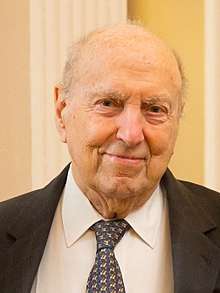Fred Aftalion
Fred Aftalion (born 2 May 1922) is a chemical engineer who has held leadership positions in the French chemical industry for three decades.[1] Fred Aftalion has also served as Vice-President of ALEPS, the Association pour la Liberte Economique et le Progres Social (Association of Liberal Economists).[2] He writes and comments on economics and politics from a viewpoint of economic liberalism via ALEPS[3] and Radio Courtoisie.[4] He has written a number of books dealing with chemistry, industry and society. In 2014 he received the Franklin-Lavoisier Prize for his writings on the history of the international chemical industry.[5]
Fred Aftalion | |
|---|---|
 | |
| Born | Alfred Henri Aftalion 2 May 1922 |
| Nationality | French |
| Alma mater | École nationale supérieure de chimie de Paris |
| Scientific career | |
| Fields | Chemical engineering |
| Institutions | Société Française d’Organo-Synthèse |
Education
Alfred Henri "Fred" Aftalion was born on 2 May 1922 to Jacques Aftalion and Renée (Haime) Aftalion.[6] Aftalion graduated from the École nationale supérieure de chimie de Paris, where he studied chemical engineering.[1] He also studied with Herman Mark, head of the Polymer Institute of the Polytechnic Institute of Brooklyn in 1946.[5]
Career
Aftalion became an engineer with Hercules Inc., working in the United States and Latin America. He returned to France in 1951 and joined the petrochemical company Naphtachimie.[5]
In 1956, he became manager of the Société Française d’Organo-Synthèse (SFOS), a specialty chemicals company which was part of the French pharmaceutical house Laboratoire Roger Bellon. Aftalion directed the company for the next three decades. During this time, the company moved from a 50/50 split between pharmaceutical and industrial chemicals, to a 20/80 split.[1] After Rhône-Poulenc acquired an interest in Roger Bellon in 1964, Aftalion became a board member of Rhône-Poulenc Spécialités Chimiques.[5]
Aftalion served as president of the Société La Vermiculite et la Perlite from 1967 to 1973.[7] He has served on the Boards of Directors of Total Chimie and of the Fondation de la Maison de la Chimie in Paris, France.[5][8]
Fred Aftalion became a member of the Mont Pelerin Society in 1971.[9] He has been vice-president of ALEPS, the Association pour la Liberte Economique et le Progres Social (Association of Liberal Economists)[2] He speaks and writes on economic and politic issues[3] from a viewpoint of Economic liberalism via ALEPS[3] and Radio Courtoisie.[4]
His book Histoire de la chimie, translated as A History of the International Chemical Industry, describes the rise of the chemical industry in the international community. It traces connections between science, industry and society. Aftalion received the 2014 Franklin-Lavoisier Prize for his writing on chemistry, industry and society.[5]
Works
- 2012, Pourquoi ne pas le dire? by Fred Aftalion. Paris : Ed. du Trident, c2012.
- 2007, Histoire de la révolution bourgeoise : de ses origines à nos jours by Fred Aftalion. Paris : Ed. du Trident, 2007.
- 1995, Protection de l'environnement : pour que de fausses solutions ne deviennent pas de vrais problèmes by Fred Aftalion. Paris : Ed. France-Empire, 1995.
- 1993, Social-démocratie, dernier avatar du socialisme : histoire d'une utopie, 1945-1993 by Fred Aftalion. Paris : France-Empire, c1993.
- 1991, History of the international chemical industry by Fred Aftalion ; translated by Otto Theodor Benfey. Philadelphia : University of Pennsylvania Press, c1991; Philadelphia, PA : Chemical Heritage Press, 2001.
- 1990, Faillite de l'économie administrée : le paradoxe français by Fred Aftalion. Paris : Presses universitaires de France, c1990.
- 1988, Histoire de la chimie by Fred Aftalion. Paris ; Milan : Masson, 1988.
- 1967, Libres, égaux, fraternels? by Fred Aftalion. [Paris] Plon, 1967.
Awards
- 3 April 2014, Franklin-Lavoisier Prize, Chemical Heritage Foundation and the Fondation de la Maison de la Chimie[10][11]
References
- "Variety Spices Small French Firm's Growth". Chemical & Engineering News. February 10, 1964. Retrieved 23 January 2018.
- Organisation for Economic Co-operation and Development (September 12, 2001). OECD Forum 2001: Sustainable Development and the New Economy Forum Highlights. Paris, France: OECD Publishing. p. 14.
- "Archives". ALEPS. Retrieved 23 January 2018.
- "Fred Aftalion". Radio Courtoisie. Retrieved 23 January 2018.
- "2014 Franklin-Lavoisier Prize" (PDF). DIVISION OF THE HISTORY OF CHEMISTRY. American Chemical Society. Retrieved August 14, 2014.
- Lafitte, Jacques; Taylor, Stephen (1999). Qui est qui en France. Paris: J. Lafitte. pp. 95–96. Retrieved 23 January 2018.
- Lafitte, Jacques; Taylor, Stephen (1977). Qui est qui en France. Paris: J. Lafitte. p. 85. Retrieved 23 January 2018.
- "Members". Fondation de la Maison de la Chimie. Retrieved 22 January 2018.
- "The Mont Pelerin Society (MPS) Background". DESMOG. Retrieved 22 January 2018.
- "Fred Aftalion receives the Franklin-Lavoisier Prize". Chemical Engineering. 121 (5): 6. May 1, 2014. Retrieved 22 January 2018.
- "People in the News: Fred Aftalion to Receive the Franklin-Lavoisier Prize". Chemical Processing. March 26, 2014. Retrieved 23 January 2018.